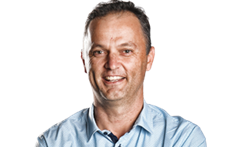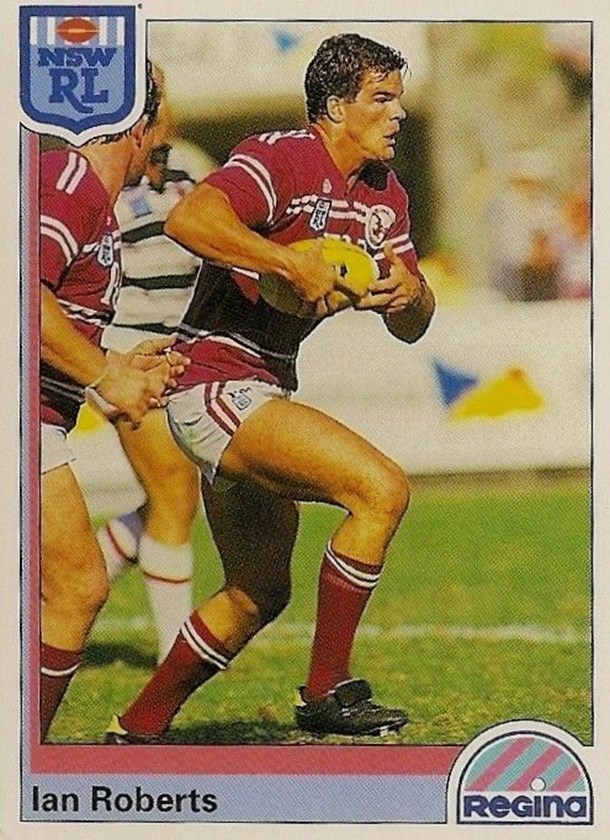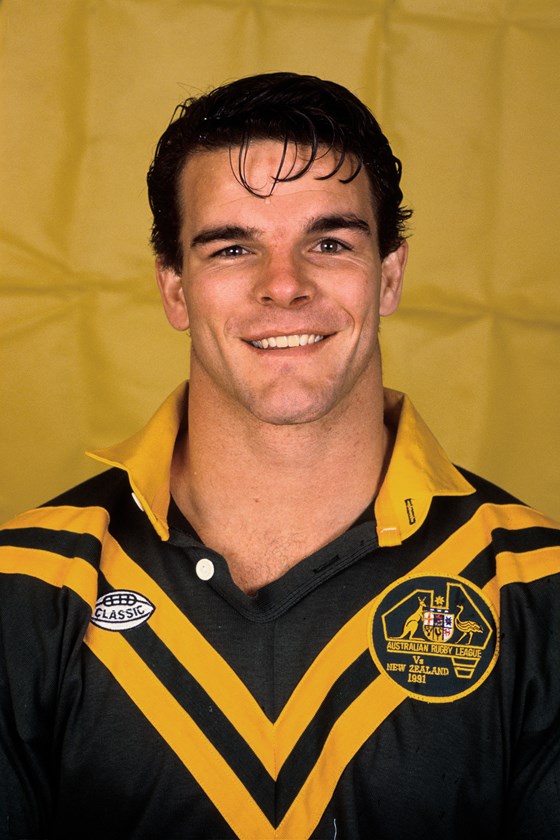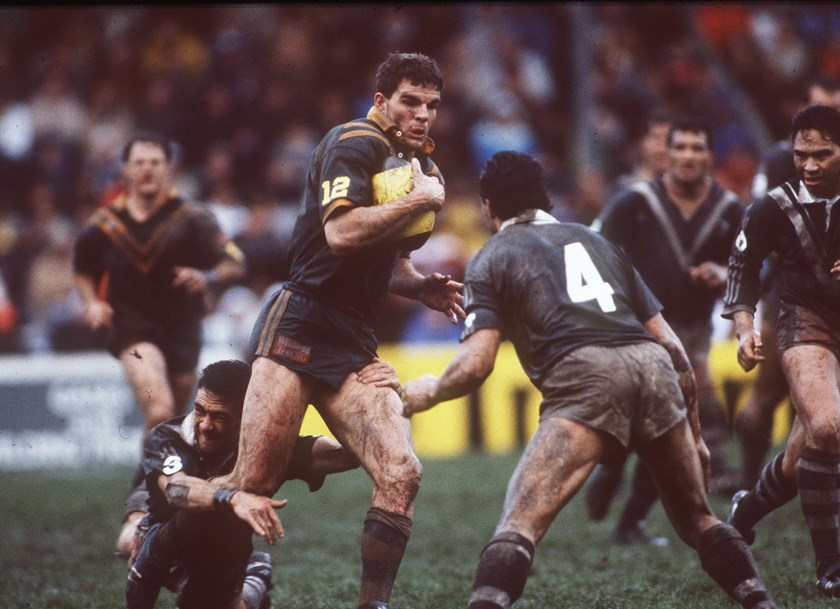Ian Roberts is happy to be known as "that gay footballer" but even happier that he is no longer the only one.
The former front-rower is these days remembered and revered as a trailblazer for the gay community after he courageously came out in the mid 1990s.
It's somewhat overshadowed what was an incredible playing career in which Roberts tallied nearly 200 first-grade games during stints at Souths, Manly and North Queensland while also dominating opposing packs for NSW and Australia in the representative arena.
The 54-year-old caught up with NRL.com during the week for a stroll down memory lane.
Legend Q&A: Ian Roberts
How did you get started in rugby league?
I started playing when I was four or five with the neighbours' kids. Like a lot of boys in 1970s it was the done thing, a lot of guys my age would have a similar story. I started with Maroubra, played for the Diggers and ended up playing the last part of my junior career with Mascot.

And how did you get a run with the Rabbitohs?
At the end of '85 they graded me and I played a few under 23 games and reserve-grade games. In '86 I got graded officially and that's when George Piggins took over as first-grade coach.
In your first-grade debut in round one of 1986, you take on St George at Redfern Oval, what do you remember from that day?
How can I forget - Craig Young gave me a smack in the mouth. He was an idol for me growing up and here we are few minutes in, packing a scrum and he smacks me in the mouth. I just stood up. I didn't know what to do.
At the end of '86 I went to Wigan in the off-season and we were playing a trophy final against Warrington and Les Boyd was there. The same thing happened - he was like a superhero to me and I tackled him in the first couple of minutes and he stood up and headbutted me across the face, split my lip, it felt like half my face was hanging off. I was kind of in shock more than anything.
That was the era where all those sort of tactics were being phased out but it was still part of the game.
The Rabbitohs made some steady progress in your time there and went close in 1989 when they won the minor premiership in your last season there. What's your main memory of those times?
In '89 we had Mario Fenech, Les Davidson, David Boyle, Wayne Chisholm, Michael Andrews, Craig Coleman, Ross Harrington, a very good side. I missed the second half of the season because I'd done my groin and we got bounced straight out in the finals.
I don't think we were actually a good enough team to have won it. Souths were always that sort of team that was an annoyance - we were capable of beating any team but also capable of losing to any team. We just lacked that extra spark, I don't know what it was.
Was money a big factor in your switch to Manly in 1990?
Money kind of was originally but I had a wonderful time at Manly from 90-95 until we lost the grand final. I loved the atmosphere, I still love the club and the supporters. I probably enjoyed my football the most there because I had matured a bit, I was 24 by the time I got there.
I had a bit more of a brain for footy, it wasn't just six tackles and kick. I played my best rugby league there.
People who have confidence will know what I mean - I felt a bit invincible at times. God, I wish I could rerevitalise that feeling, that spark, almost being able to read the play ahead of time. It would be wonderful to take that into another career now
In the early 1990s you were part of some very strong NSW and Australian sides and then it came to an abrupt end after the Super League war broke out after the 1994 Kangaroo Tour.
I was lucky enough to play in five series for NSW and we won four of those, I also played in the tri-series for NSW in 1997 in Super League which had New Zealand in it. When we went away with the Kangaroos I was playing my best football.
It was a wonderful experience over there, there was no talk about Super League - that all came out when we got back. We weren't aware of the situation about to happen.
Was there any rivalry between the players from different clubs and states on that tour?
The 10 weeks away was one of the best times of my life, the camaraderie, the friendship was amazing. I had a real good relationship with everyone on the tour, Terry Hill was my roommate.
I made a decision before we went that I was going to go on the tour as a gay man, I wasn't going to pretend that I wasn't. The whole 28 members of the squad were fantastic, so inclusive, they never once questioned me in a bad way.
That is what made that tour so special for me personally. It was the first time I'd felt free in my life.

Coming out, the Australian media had always known, it was the worst-kept secret in rugby league. Even when i was at Souths, I always had a partner and everyone knew. My boyfriend at the time I was at Manly, Shane, he was Igor the Eagle, the mascot that was running up and down the sidelines supporting the team.
There was a couple of people at Manly who were uncomfortable with it and at times their reaction was totally not acceptable but I made sure they knew it wasn't. I don't want everyone to think it was all roses because it wasn't.
It was a huge moment for people but the way the majority of people accepted me was great and it made it a lot easier for my family as well.
This may sound strange but does it almost feel like people forget how good a player you were because you're known for coming out?
I understand to a lot of people I'm "that gay footballer". But there's others now, Keegan Hirst at Wakefield Trinity came out a few years ago. If I'm going to be remembered I accept that it will be about my sexuality.
Back to on the field and in 1995 you were in the Manly side that was a raging hot favourite to beat Canterbury in the grand final but lost. What happened?
We played Canterbury about during the season and beat them big time (26-0) and that was the worst thing that could have happened to us. When we got to play them in the grand final I felt confident that we were a shoo-in.
But it was the worst game we played all year, we got carried away with ourselves. I've still never watched the game. I've tried a couple of times but I've lasted about five minutes. It's too painful. I can't watch it.

You didn't play in 1996 because of a contract dispute and Manly won the premiership. Any regrets?
I kind of made my own protest against the ARL. I was committed to playing for Manly in 1996 but I'd already signed in 1995 for Super League from 97-99. I was fully committed to the obligations of my contract but at the end of '95 there were Tests against Great Britain but us Super League guys weren't picked and I didn't think that was right - I was prepared to honour my contract so I should have been eligible to play [for Australia].
I was happy Manly won because I was still totally maroon and white at heart but somewhere along the line your word has got to be good for something. That was just the way it was - they still won the comp so they didn't need me to win it.
What do you think of when you're asked about the mad year of 1997 when Super League was up and running?
I loved it because I'd signed with North Queensland and Tim Sheens was the coach, I just wished we could have been more competitive. He came up to me at training one day and asked me to be captain - my sexuality never came up at all.
I was blown away by how accepting everyone was in Townsville, the fact that it wasn't an issue was great. The two and a half years I had up there were fantastic, it's no surprise to me to see that club do so well over the last five years or so - the way they support their community and the support they get in return is wonderful.
Why did you retire in 1998?
I had a dodgy knee. You can't play forever. I look back now at rugby league and think how did I ever play such an aggressive, nasty, physical sport.

How did you handle post retirement life?
It's a really rough situation for anyone to be playing at the peak of a sport and then step away and then there's no adulation, no recognition, it's hard to explain.
A year and a half after retiring my car broke down 500 yards from NIDA [the National Institute for Dramatic Arts] at Kensington. I was walking up to the servo so I thought I'd duck my head in and see if there was anyone who could help me with an acting course. [NIDA acting teacher] Kevin Jackson came out and met me and took me under his wing and became a mentor.
After a few months he asked me why I didn't apply for the full-time course? I thought I was too old because I was in my late 30s. It was the best advice I've taken.
What's been the highlights of acting?
I ended up spending six or seven years in LA, I got back five years ago when my Dad wasn't well and he passed away. But I do intend to head back overseas again.
I do some work with the NRL at the moment, doing the improvisation program with all the teams. Myself and three or four other actors put the boys in very awkward situations around misogyny, racism, homophobia, drugs that they can find themselves in, in real life.
It's a safe situation for them to get it wrong, where there's no cameras. And we talk about the scenarios after it.

And lastly, do you still watch a lot of footy these days?
Mainly the three clubs that I played for. I'm a Souths junior so I suppose I've got a little more red and green blood than maroon and white or the Cowboys colours.
The rules have been tweaked to make it a safer game than when I played, it's more athletic. Apart from three or four specialist positions, you could pretty much interchange the players around because they can all run the 100 in about 12 seconds, are all about 100kg.
I always thought there was too much stopping and starting when I was playing. It's a lot quicker now, it's a much better game to sit down and watch.















